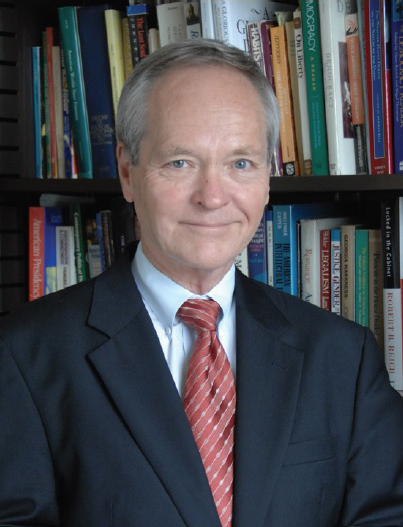In memoriam: Distinguished university Professor of Political Science Emeritus Philip Abbott
My first meeting with Phil Abbott was on the initial evening of my interview for the chair's position in the Department of Political Science in 2004. Although we both received our doctorates from Rutgers University, he was years ahead of me in the program, and I knew him only by his reputation among the graduate students. For my interview at Wayne State, the dean of arts and sciences invited Phil to the dinner with us at the top of the Renaissance Center, and the reason was clear: to introduce me to the department's most accomplished faculty member. I joined Wayne State as chair of the Department of Political Science that August and one of the principal reasons for my decision was the opportunity to work with a scholar of the stature of Philip Abbott.
 Professor Abbott is the author of 14 books and three edited volumes. These works are among the most important in the fields of political theory and the American presidency. His book Political Thought in America is the leading text on American political theory. Abbott's prodigious scholarly record also includes the authorship of roughly 10 chapters in edited collections. He published over 35 sole-authored articles in such prestigious journals as Perspectives on Politics, Polity, The Journal of Politics, Political Research Quarterly, Political Theory, and Presidential Studies Quarterly. This immense body of exceptional work established him as one of the leading scholars in the discipline of political science.
Professor Abbott is the author of 14 books and three edited volumes. These works are among the most important in the fields of political theory and the American presidency. His book Political Thought in America is the leading text on American political theory. Abbott's prodigious scholarly record also includes the authorship of roughly 10 chapters in edited collections. He published over 35 sole-authored articles in such prestigious journals as Perspectives on Politics, Polity, The Journal of Politics, Political Research Quarterly, Political Theory, and Presidential Studies Quarterly. This immense body of exceptional work established him as one of the leading scholars in the discipline of political science.
Phil received his Ph.D. from Rutgers in 1971, began as an assistant professor at Wayne State in 1970 and was promoted to full professor in 1980. Long recognized as one of the nation's foremost political theorists, Phil had a profound appreciation for the relevance of his subject matter to contemporary life and its value in illuminating real-world ethical dilemmas. His works exhibited uncommon sensitivity to such issues, setting him apart from others working in the field of political theory. In the 1990s, Professor Abbott began to receive national recognition for his research in an additional field - the American presidency. It was in this area of specialization that Phil's reputation achieved even greater heights. Five of his last eight critically acclaimed books analyzed the office and role of the presidency, strong and weak presidents, untimely presidential successions, and a masterwork on Franklin Delano Roosevelt.
In keeping with Phil's extraordinary record of scholarship, he was the recipient of prestigious external awards, including his appointment by the American Fulbright Association as the Thomas Jefferson Professor of American Political Institutions at the University of Amsterdam. Dr. Abbott was also the recipient of every major internal award for scholarship that Wayne State University confers. He was the first faculty member in the Department of Political Science - and one of the few faculty members in liberal arts - to be inducted into the Academy of Scholars. He was the recipient of two Board of Governors' Faculty Recognition Awards, one for his book Furious Fancies: American Political Thought in the Post-Liberal Era, and a second for his two books, Seeking Many Inventions: The Idea of Community in America and States of Perfect Freedom: Autobiography and American Political Thought. Among his other awards were a Gershenson Distinguished Faculty Fellowship, a Distinguished Graduate Faculty Award and the Michigan Association of Governing Boards of Higher Education Award. In recognition of his stellar accomplishments as a scholar, Dr. Abbott was named Distinguished University Professor in 2005 - the highest academic honor Wayne State University can bestow.
Phil's remarkable record extended to his teaching and service. He directed over 10 doctoral dissertations and over 25 master's theses. He taught a large number of undergraduate and graduate courses, including the required doctoral seminar in Philosophic Problems of Social and Political Inquiry. In recognition of the superb quality of his teaching, Abbott received both the university's Graduate Mentor Award and the President's Award for Excellence in Teaching.
Lastly, Phil Abbott made huge contributions to the governance of the department, the college and the university. He served as an elected member of the department's Policy and Personnel Committee and as its chair for nearly 20 years. Dr. Abbott held the role of assistant dean and graduate officer of the College of Liberal Arts for three years, served one or more terms on over a half-dozen college committees, and, in 2001, was named president of the Liberal Arts Faculty Council. Professor Abbott was an elected member of the Academic Senate for over a decade, and he chaired the policy committee of that body over a period of multiple years. In toto, his service to the university included membership on over 30 different standing or ad hoc units and committees.
In closing, I wish to note that Philip Abbott's reputation as a scholar and the status he conferred on the Department of Political Science, the College of Liberal Arts and Sciences, and Wayne State University is without equal. With his passing, the university and the discipline have lost a great scholar; the department has lost its leader; Patti, Megan, Josh and Kevin have lost a husband, father, and grandfather; and I have lost a friend. Nevertheless, the insight and wisdom provided in his works lives on.
Daniel Geller, chair
Department of Political Science